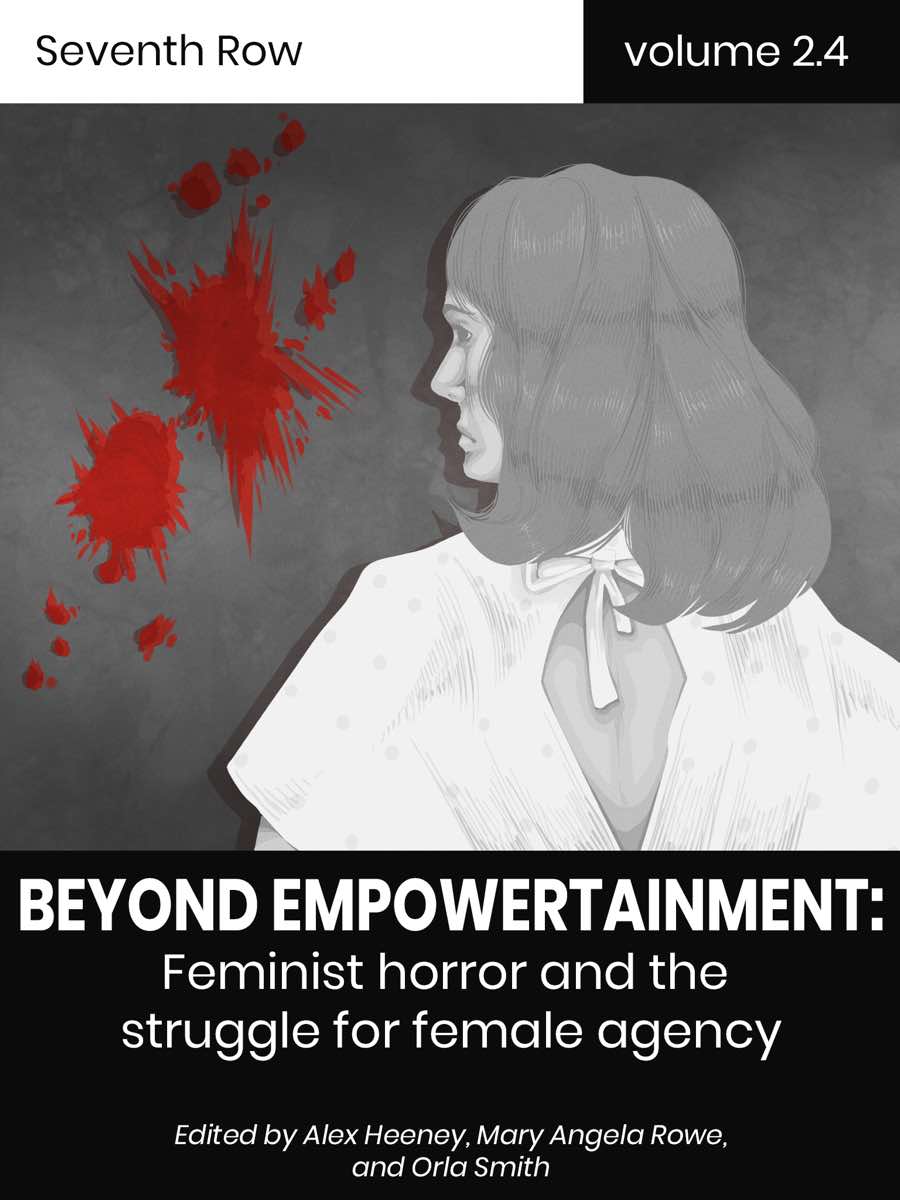Director Michael Venus and star Gro Swantje Kohlhof discuss their new German horror film, Sleep, which deals with dreams, patriarchy, and Nazis. This is part of our coverage of the Fantasia Festival.
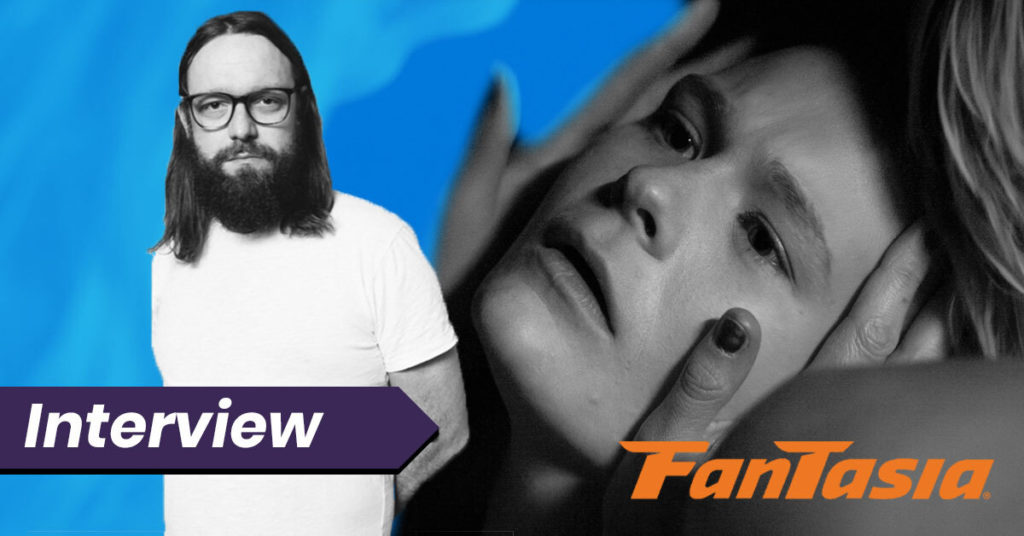
At the beginning of Sleep, the new horror film from director Michael Venus, Marlene (Sandra Hüller) wakes up from a restless night full of nightmares and her daughter, Mona (Gro Swantje Kohlhof), suggests the problem may be sleep apnea, which causes you to stop breathing. What troubles Marlene runs deeper than the physiological; she’s haunted by family history and the horrors of the past. When Marlene tries to visit the real places where her dreams were set, she goes crazy and ends up paralyzed. It’s up to Mona to figure out what the dreams mean so she can save her mother.
Co-written by Venus and Thomas Friedrich, Sleep is a slow-burn film where you sense the horror before you see it. It’s in the emptiness of the hotel where Mona stays, a luxurious place with nobody in it. You can hear every sound: every droplet of water from the tap and every footstep. And then, it’s in the visions Mona sees of the past hotel owners who killed themselves in the hotel.
As this is a horror film set in Germany, you can bet that it has the Holocaust, and the personal denial that followed, on its mind. There’s the constant presence of boars, the last wild animal of the German forests, which feel like a symbol of German heritage — something that immediately makes you think of the Nazis and their desire for a ‘pure’ race. And there’s a hotel with a dark past where people died and nobody talks about it. Although Germany cranks out Holocaust films annually, like clockwork, exploring this through a genre lens is surprisingly groundbreaking. As Venus explained, “The horror film culture ended abruptly in 1933 in Germany. When the real horror exploded, and the concentration camps were built, they only produced Heimatfilms, super-sweet films about nice landscapes and lovely people.”
Just as the heightened premise of Christian Petzold’s Phoenix — a concentration camp survivor has plastic surgery on her face, and becomes unrecognizable to her ex-husband — provided a heightened world to explore the trauma of the Holocaust, Venus uses genre in a similar way here. Nothing is clear cut in what the film means. It’s designed to feel like a dream, and you may find yourself puzzling if you missed a beat because things shift and change without explanation in the way they would in a dream.
This proves fertile ground to explore everything from patriarchy to the sins of the past and the resurgence of right-wing politics. It can also get a bit muddled, and the resolution is ambiguous enough to be a little frustrating. Can we root for Mona’s self-actualization if it comes at the price of refusing to cow-tow not just to fascism but also to her family that’s fighting it? Can we even draw such 1:1 comparisons fairly between the creepy ‘über Deutsch’ characters in the film and Germany’s past?
I’m not quite sure if the film sticks the landing, but it’s evocative stuff along the way. Gro Swantje Kohlhof gives a visceral, physical performance as someone who goes from passive, to sexual, to calling all the shots, even if it means inflicting violence on herself. She also has to play two versions of Mona: the awake and conscious Mona, and the unconscious Mona of Mona’s (and other people’s) dreams. There’s also great supporting work from Sandra Hüller as Mona’s mother, a fragile woman who is keeping secrets about the horrors she’s facing — which only makes them worse. Hüller has had a stellar year for supporting turns where she steals the screen, from Exile at Sundance in January, to the frenetic director in Sibyl (due out this month), to the no-nonsense childcare manager in Proxima. She’s just as compelling to watch scared and losing her mind in Sleep.
After a world premiere at the Berlin Film Festival, Sleep screened at this year’s virtual Fantasia Fest. I caught up with the film’s director, Michael Venus, and star, Gro Swantje Kohlhof, to talk about their collaboration, the significance of the sites in the film, and why making a horror film in Germany proved to be a radical act.
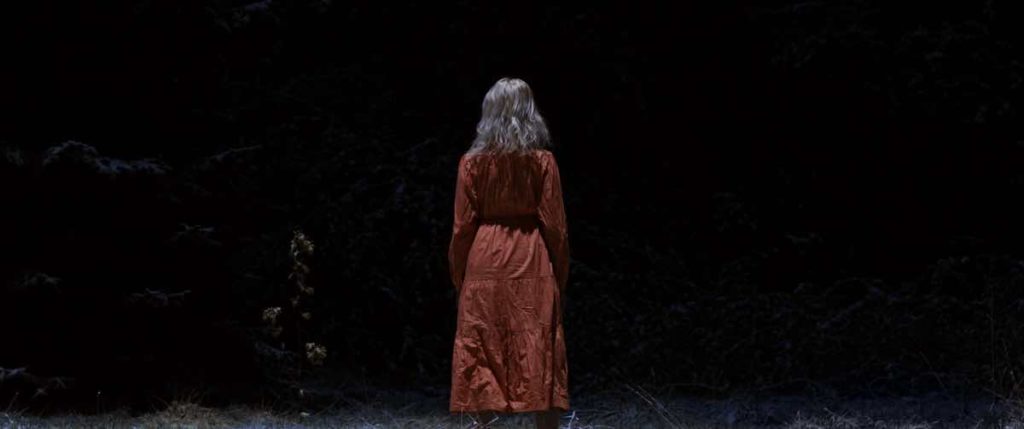
Seventh Row (7R): Where did the idea for the film Sleep come from?
Michael Venus: Our producer asked us if we wanted to make a horror movie. My writer Thomas Friedrich and I talked one evening about what is horrifying us. The first was patriarchy, which is like a monster in us and around us, and was frightening to us. To make a horror film is to make a film of confrontation, not of escapism. So we wanted to do research on patriarchy, and then came all the other stuff. It comes from our subconsciousness, our education, our culture, and so on.
7R: Gro, how did you get involved with the film Sleep?
Gro Swantje Kohlhof: Quite early, actually. Normally, as an actress, you would join the process much later, but I read five or six different versions of the script. I got involved at a point where we didn’t even have all the financial stuff sorted out. There were still so many different versions of the script. I did a movie in 2012, Nothing Bad Can Happen, with our producer Verena Gräfe-Höft. She and Michael are good friends. Michael saw that movie, and Verena recommended me.
So we met up many years ago and talked for hours about the script and the topics. It was clear from there that I would join the process. But then it took another four years or something before we started shooting.
Michael Venus: Yeah, Germany is—
Gro Swantje Kohlhof: Slow for financing genre!
Michael Venus: Yeah, if you want to make a genre film — call it a thriller; call it a horror film — it’s very hard to get the money together. Sometimes, I felt like I’m doing pioneer work because I always had to give a lecture about the cultural dimension and relevance of horror films. It was kind of an adventure to realise this in Germany.
7R: Do you have to explain the meaning behind the film?
Michael Venus: Absolutely. A lot of financiers we met had that impulse, in the moment they hear it’s a horror film, it’s like I said, “hard-core porno movie.” The horror film culture ended abruptly in 1933 in Germany. When the real horror exploded, and the concentration camps were built, they only produced Heimatfilms, super-sweet films about nice landscapes and lovely people. This tradition and culture of horror films never really came back.
I’m very happy with the reviews we got from America, the UK, Korea. They’re very different from the reviews we got in Germany.
Gro Swantje Kohlho: In Germany, there’s not always a language to describe these kinds of movies. People still try to label them. This must be a horror movie. This must be a romantic comedy. So you don’t develop a vocabulary to describe something that isn’t one thing and only one thing, something that uses different genres. The English critics had much better descriptions for the film, because they didn’t bother to label things. They just described what they saw.
7R: Sleep is a film about how people are ignoring the past and the way the locations have the history of the trauma of the past built into them. How did you think about how to talk about that in the film?
Michael Venus: When you deny things from the past, the past comes back as a monster which haunts you in your dreams. If a family doesn’t start to confront itself with its wounds, they can’t heal. The wounds of our forefathers which weren’t treated, now come back to the grandchildren and the children. The past always catches up with us, at least in our dreams.That’s the backbone of that whole storyline which is more a dreamlike storytelling.
Gro Swantje Kohlhof: We have to recognize all those internalized patterns within ourselves, in order to face them and get over them. But we have that all in ourselves without even knowing. You have to recognize it in order to position yourself to [confront it].
7R: As an actor, how much do you think about all of those resonances versus just thinking about, in the moment, what your character is going through?
Gro Swantje Kohlhof: That’s also what I liked about the script. It’s about this huge general situation where you can’t even see where it all comes from and where it all leads to. And then you get to see that or experience that from a very private perspective of someone who also can’t see the whole picture. I use that metaphor that it’s like driving in the dark, and you can only see two metres ahead. You know that it’s way darker, and there are more scary things to come in the dark, but you keep going; you keep driving. You can’t act in every scene the complete wholeness of the storyline. That would also make it hard for people to identify with the struggle Mona takes in the journey.
For each scene, it was always about what stage is she in right now? What is her problem right now? What is she fighting right now? How much does she learn? How much does she grow? At which point does she take control of her narrative and refuse to be scared, even though she knows this is way bigger than herself? She has energies inside of herself that she didn’t even know about that she decides to own instead of letting it control her.
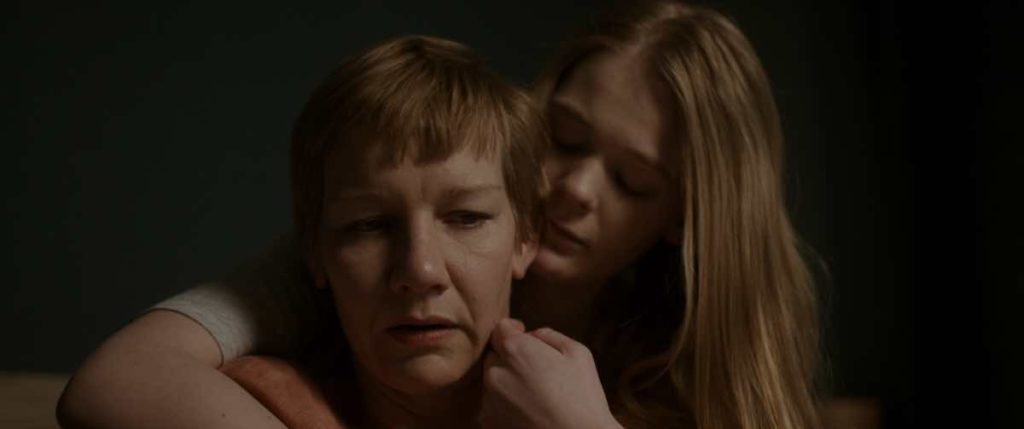
7R: How did you work to create the relationship between Mona and her mother, played by Sandra Hüller?
Gro Swantje Kohlhof: We actually didn’t have too much time together. We had like two days of rehearsal together. Obviously, we did a lot of talking about it beforehand. The time we actually got to spend together wasn’t that much, but it was a very, very nice experience, because obviously, Sandra is such a professional. We got along very well. The mother-daughter resemblance between us is also a bit spooky for me.
We both come from theatre, so maybe we had a bit of the same language, when it comes to talking about the scenes and acting. The key is always being able to trust your colleagues and being able to be inspired by each other. We had one and half weeks together. We shot the last scene of the movie between us on the first day. That was nerve-wracking for me. I was very blessed to have someone like Sandra by my side to be like, “We can do this together.” She’s the best.
7R: Partway through the film, your character is asleep, but ends up also present in a kind of fugue state in another location at the same time. How did you think about physicalizing the difference between the awake Mona and the asleep but present Mona?
Gro Swantje Kohlhof: I was so sleep deprived during the shoot because I was doing theatre at the same time. So I would always drive through the night or take an early flight to be there. Luckily, whenever I got to the set at seven in the morning, we were always doing a scene where Mona wakes up totally exhausted from a hard night.
She looks different. Awake Mona looks properly awake, with huge dark circles under her eyes. And hse moves differently when she’s in a dream state. We know that from our dreams, sometimes, scenes transition from one place to another, and you don’t know how you got there. You’re not in control of it. The rooms kind of move around you, rather than you moving around the rooms. When the real Mona is walking in the real world, things are more painful and exhausting. In the dream world, you’re not harmed anymore. Your wounds are gone. But you’re also more passive, looking from the outside in to what’s happening in front of your eyes, and other people are deciding what the narrative is about.
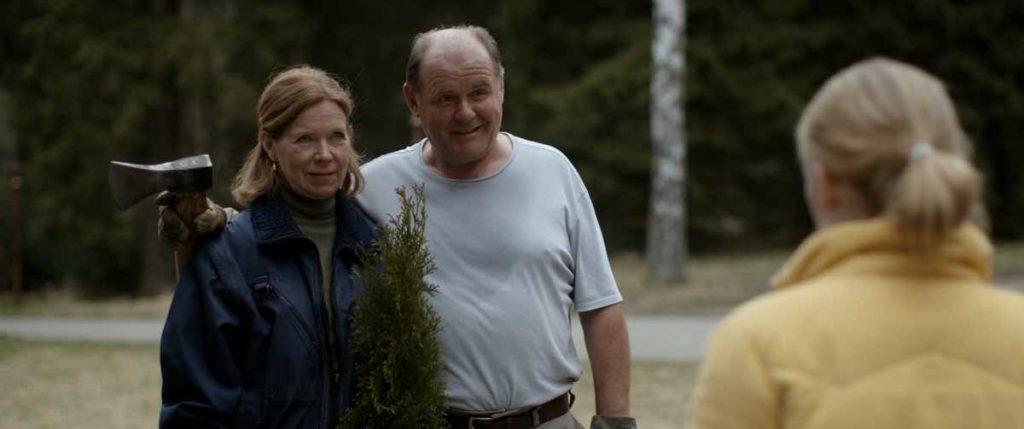
7R: I guess that passivity is part of why it comes as such a surprise that she stabs herself in the neck. How did you work out how to work up to that?
Gro Swantje Kohlhof: That was such an important moment for Mona. We talked about that a lot and what it means for her. That’s the moment where she finally takes control control. It doesn’t matter by which side. There are different powers trying to manipulate her and use her. She feels very helpless and exposed to it, because she doesn’t know what it all means.
She feels that she has some kind of power within herself but she’s super afraid of it because it doesn’t have a name yet. She doesn’t know what it means or where it comes from. She’s so scared of going crazy like her mom.
She plays along with the rules that everyone else imposes on her. But she’s passive, trying to struggle through it. It’s the first moment where she actually takes a decision on her own about how she wants to run the story, how she wants things to go. She refuses to be just a pawn for someone else’s motive.
7R: You kind of expect her to stab somebody else.
Gro Swantje Kohlhof: And you kind of want her to, in that moment! You feel like that would be OK. You want to be on the side of Trude [Agata Buzek], her grandma, who tells her she can end it now, that if it ends with him, everything is going to be fine. You kind of want her to do it. But she chooses not to be on any side, but to be in control of her own narrative.
7R: How did you approach the sound design for the film Sleep?
Michael Venus: Interesting question, rare question. I can tell you one anecdote. When you spend four hours in the studio, with nine speakers around you, because we had a very elaborate mix, and you look at your watch, you realise that you’ve been listening to a two-second noise for four hours to [get it] just right. There are so many acoustic layers. You’re not even conscious of all of them, but sound is really connected to your body.
The most magic moment in the whole film, acoustically, is when we — vroof — take all the noise out. It’s Mona’s first dream at the hotel. There’s a lullaby, glockenspiel sound, and a lot of rumbling in the sound design, and then it switches to complete mute, before the jump scare. We have a lot of sound so that the muted moment has more pressure. When there’s no night noise whatsoever. The scariest sound in the whole film is when there’s nothing to hear. And Mona does nothing. She’s just there, and walks, but the sound makes the moment very dramatic.
It was fun to play with psycho-acoustic moments, to play with what is going on inside of the head of the character who is leading the scene. If my theory is right, and the whole film is a dream, then we are all the time in the perspective of a dreaming person.
7R: Are you thinking about whose dream it is? Are we in Mona’s perspective or one of the other characters’? Because there are scenes that she’s not in.
Gro Swantje Kohlhof: You have the question of when is someone dreaming, and when is it reality? Or when is it just imagination that isn’t real, but creates a real situation because someone takes it for reality? And then, who’s dreaming what at which time? You can always share your nightmares. Sometimes, it starts out as Mona’s nightmare, and then somebody comes to visit, and suddenly, there’s three people sharing one dream. But they will never have the same perspective on things in that dream. Everyone is sleeping on their own but sharing one nightmare. But it’s also very confusing to try to act! Like, which scene are we doing now? Who’s dreaming what? Whose head are we in?
Michael Venus We had our algorithms and plan with different colours. The whole crew knew where we were. Each scene was on a different card which was colour-coded. We’d have one colour card, which was for Trude’s perspective, and another colour card which was Mona’s perspective. And that would tell you where we are. It was fun to have a whole crew around you who know what you’re doing. Like, “OK, this is a night shot dream sequence, connected with reality. But in that night shot, there’s a room where it’s day time.” That was very complicated, but when you get that, you’re very happy, because nothing was normal. Nobody had a normal job making that film.
7R: How did you pick that hotel and think about shooting it?
Michael Venus: If you see a film, it can’t be unseen, like a realistic experience. It leaves pieces in your consciousness and can come back in your dreams, but morphed. We said, if we have a hotel, like in The Shining, we have to play with it. We have to give cineastes and film nerds like a postcard from the hotel in The Shining. Every film is like a dream. It comes very close to a dream. Jean Cocteau said that filmmaking is a sleep in which I’m dreaming. We really took that layer into the storyline.
7R: There’s certainly a gothic horror element to the hotel in with a dark past and all these empty rooms.
Michael Venus: It’s the haunted house idea in genre. Genre has so many rules, and the fun part comes when you make an original variation out of the conventions — the structure, narrative mechanics — so that it comes into your brain and eyes in a new way.
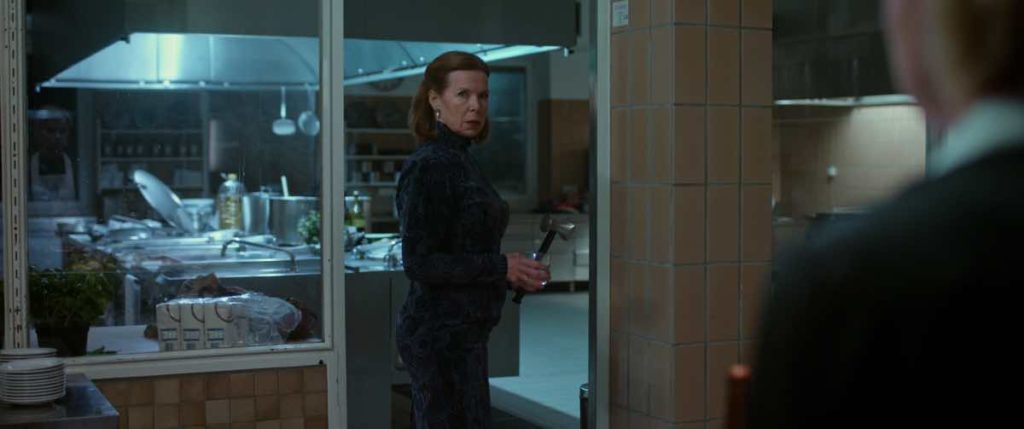
7R: What was your experience shooting in that hotel? Did you feel any of that eeriness that we see in the film?
Michael Venus: Of course, it was a real lost place.
Gro Swantje Kohlhof: It was way scarier than the scenes that we did. When you do horror scenes, it’s technique. There are people around. It looks scary later on, but in the moment, it isn’t. But being in this lost place, which is a huge house, you can still feel the presence of people who lived there and have been there.
It was also an old sanitarium, like a classic setting for a horror film. It was very magical to see all those rooms, and you could tell what kind of purpose they were built to serve, but now they don’t have that any more. So what are they for now? And now, a whole film crew walks in, and uses bits and pieces for their own purposes. There’s another kind of horror in the place.
It was a huge place. So if you would go to the toilet, you would just walk for a while on your own. It was just empty rooms, empty rooms, empty rooms. After every corner, I was always a bit scared sometimes if they maybe forgot someone who was still living there.
Michael Venus: It’s kind of a main character, too, the hotel. We found it quite close to shooting. It told us the story in quite a new way. We did a rewrite, and changed 50% of the action — what happens where and how. We kept our core, but we wanted to embrace that place. In the script, before we found that place, it was a smaller location in our mind. But we felt it’s good to have these huge empty rooms where someone’s sick mind projects this idea of a new world.
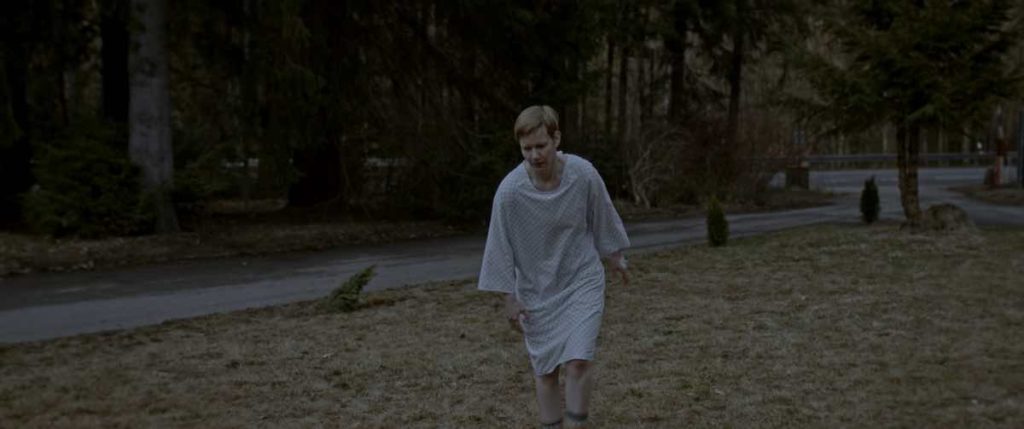
7R: Can you tell me about the forest?
Michael Venus: The forest is super spooky because it’s a real place nearby the hotel. There is an old factory in it, built by the Nazis, hidden by the trees, where they produced TNT for the war, with forced labour from the concentration camps. It was super dangerous work. Thousands of people died in explosions. People got yellow skin and yellow hair, and died after a short time of working with those chemicals directly without protection.
That’s a real place nearby the hotel. You have to make an extra film about it. It’s a huge topic. We know we cannot use it as a trope. But we can build it in our story, and have a perspective on it.
The forest is also an old German forest of the Grimms’ fairytale. It’s where displaced people and witches lived. It’s away from the society of the village. The forest is where bad people live, and good people can die.
And the Nazis used the forest as a symbol of heroism. The forest was an “über Deutsch” — super German — landscape.
Gro Swantje Kohlhof: They would say things like, “A man is like an oak tree.” They would use the symbolism of German nature.
Michael Venus: When I saw the ruins of that factory in the forest, it was, for me, a metaphor of our story. These remains are fading away, so you will have no evidence of what happened there. But just because you can’t see it, doesn’t mean it hasn’t happened. So it fit into our thoughts about what the film was about.
